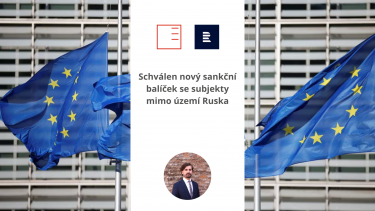Preparing news media in Bosnia and Herzegovina and Serbia for the digital age
The project aims to equip civil society organisations in Bosnia and Herzegovina and Serbia with comprehensive knowledge of media pluralism, media freedoms, and access to information necessary in the digital transition of the news media sector.
Show more
RTVS | The Future of the Visegrad Group
Differences on key issues between the leaders of the Visegrad Four countries are now being widely discussed in the context of the ongoing summit in Prague. How the relations between the countries will develop, whether we are heading towards the disintegration of the V4 or whether this is an eternal partnership of reason, was analysed by Žiga Faktor, Deputy Director and Head of the Brussels Office, for the RTVS podcast Z prvej ruky.
Show more
ČT24 | V4 summit in Prague brought questions about the groups' necessity
The new Polish Prime Minister Donald Tusk came to the Prague V4 summit asking whether the Visegrad group is still relevant. Cooperation on a high political level is complicated by the countries' different approaches towards the war in Ukraine. While the Czech Republic and Poland continue to support its interests with the same intensity, Slovakia and Hungary are reassessing them. Martin Vokálek, Executive Director of the EUROPEUM Institute, talked about the importance of the summit and the relations between Poland and the Czech Republic for ČT24.
Show more
ČRo | New sanctions package includes entities outside of Russia
The new thirteenth package of sanctions against Russia was approved today by representatives of the EU. The sanction list has been expanded by another 200 individuals, companies, and institutions. These include entities outside of Russia that are involved in bypassing measures preventing the purchase of military technologies by Moscow. An expert commentary for the Radiožurnál program was provided by EUROPEUM's deputy director Viktor Daněk.
Show morePrávo | Von der Leyen wants to continue leading the EU
As expected, Ursula von der Leyen has confirmed her interest in continuing as President of the European Commission. Since her arrival, she has faced crises such as Brexit, the global pandemic, the battle over vaccines and the Russian invasion of Ukraine. The announcement of her candidacy was analysed by Viktor Daněk, deputy director of the EUROPEUM institute, in Deník Právo.
Show moreCafé Evropa podcast: Two years since the invasion: what's next for Ukraine?
We invite you to a public recording of the Café Evropa podcast: two years since the invasion: what's next for Ukraine? The recording will take place on Wednesday, 21 February 2024 at 17:30 at Langhans - Kavárna a Centrum Člověka v tísni, Vodičkova 37, Prague.
Show moreBalkan Insight | Czechia: Close of 2023 a grim warning of difficult times ahead
Faced with multiple domestic and geopolitical challenges and a population vocally demanding change, Czechia’s unpopular government will urgently need to find new impetus if it is to stand a chance against resurgent right-wing populists. Our researcher Klára Votavová provided her expert commentary for Balkan Insight.
Show moreRTVS | The heads of Polish public media have been dismissed
The new Polish government is marked by significant changes. One of them is changes in personnel, not only in the state authorities, but also in the public media. On how the opposition and Polish society have reacted to this and what further effects it may have on Poland, our deputy director Viktor Daněk commented for RTVS.
Show morePrávo | Merchant Orbán cashed in Brussels
The EU opens accession talks with Ukraine and Moldova, contrary to Hungary's wishes. Even so, Hungary did not come out of the negotiations deprived - the European Commission released to Hungary 250 billion crowns from the funds blocked so far. How much longer can Orban hold Ukraine hostage in his decision-making? Our deputy director Viktor Daněk commented on the topic for Právo.
Show moreBlog | Prague passable - or clogged? The dilemma of sustainable transport in the city
Prague faces increasing dependence on intensive car traffic, leading to growing problems with traffic, parking and deteriorating quality of public space. The increased number of vehicles means not only pressure on safety and traffic fluidity, but also environmental risks associated with internal combustion engines. Despite growing public support for public transport and car traffic regulation, finding a compromise between individual convenience and urban sustainability remains a challenge.
Show more
Staroměstské náměstí 4/1
Prague 1 - Staré Město
110 00
tel.: +420 212 246 552
email: europeum@europeum.org
https://www.europeum.org








